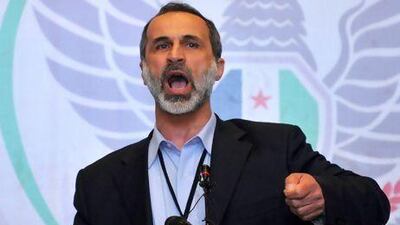ANTAKYA, TURKEY // The Syrian opposition leader Moaz Al Khatib yesterday called on rebel fighters to take a clear stand against the ideology of Al Qaeda, after ties between militant groups in Syria and Iraq were made public.
His call came in response to Tuesday's confirmation by the head of the Islamic State in Iraq, an Al Qaeda affiliate, that it was formally merging with the Syrian rebel group Jabhat Al Nusra.
"The bottom line is that Al Qaeda ideology doesn't suit us, and rebels in Syria have to take a clear stance about this," Mr Al Khatib, the leader of the Syrian National Coalition, said yesterday on Facebook.
Al Nusra left little room for doubt about the group's ideological underpinnings, with its commander saying the group remained loyal to Al Qaeda leader Ayman Al Zawahiri, who had made his own statement on Sunday urging Syria's rebels to establish an Islamist state.
"The sons of Jabhat Al Nusra renew their pledge to the sheikh of jihad Ayman Al Zawahiri and declare obedience," Abu Mohammad Al Jolani said in an audio recording posted online yesterday.
The group is one of the most powerful and effective forces fighting against the Syrian president Bashar Al Assad's military, and has played a major role in rebel gains, including the capture of Raqqa, the first provincial capital to fall into opposition hands.
The Free Syrian Army, an umbrella group of opposition forces fighting against the regime, also distanced itself from radical Islamist thinking yesterday.
"We don't support the ideology of Al Nusra," said Louay Meqdad, an FSA spokesman.
FSA units and militants, including Al Nusra fighters, do coordinate attacks against regime forces, he said, but were not bound together.
"Nusra exists, it is financed and it is armed," Mr Meqdad said. "That's why certain brigades of the FSA cooperate with them on certain operations on the ground."
The statements from the rebel leadership appeared to be an effort, especially by Mr Al Khatib, a moderate Islamic scholar, to strike a balance between keeping Al Qaeda at arm's length without turning against Al Nusra entirely.
Rebel forces would be significantly weakened if it were removed from the battlefield. Yet with the SNC still seeking international support, including weapons supplies for the FSA, yesterday's public affirmation that it is allied with Al Qaeda is unlikely to help that element of its cause.
Washington has long classified Al Nusra as a terrorist group because of suspected links to Al Qaeda in Iraq, much to the irritation of Mr Al Khatib, who had called on the US to rethink its decision.
Mr Al Jolani confirmed that the group had received financial backing from the ISI and praised the work of jihadists in Iraq, and their leader, Abu Bakr Al Baghdadi.
However, there were also hints at the divisions within radical groups and the sensitivities they face while waging war in Syria.
In particular, Mr Al Jolani's statement alluded to the bloodthirsty and intolerant reputation earned by the ISI during years of war in Iraq, in which it not only fought US troops but also carried out devastating bombings, sectarian attacks targeting Shiites and broader atrocities against civilians.
The ISI alienated its allies in powerful Iraqi tribes to such an extent that they eventually turned their guns on it, siding with the American troops they had once battled against and forming Awakening Councils. By 2008 these US-backed armed groups had destroyed much of Al Qaeda's network in Iraq.
Al Nusra seems to be trying to avoid that mistake, and has sought to win the hearts and minds of the local population, with some success. In contrast to often ramshackle FSA units, it has remained disciplined, avoided looting and helped civilians with supplies of food and fuel.
It has also avoided making hardline demands of residents concerning what it deems to be proper Islamic comportment, such as women wearing headscarves and a ban on smoking.
"We reassure our brothers in Syria that Al Nusra's behaviour will remain faithful to the image you have come to know, and that our allegiance [to Zawahiri] will not affect our politics in any way," Mr Al Jolani said.
The statement also said his units had "not been consulted" over the ISI's merger announcement and would not change their flag to unite under a single banner with the Iraqi group.
Syria's insurgency remains complex and, although core elements of Al Nusra are foreign fighters, many of the group's members are Syrians.
Extremist sentiments, and sectarian intolerance of the kind espoused both by Al Qaeda and fanatical Alawite loyalists fighting for the regime, do appear to be on the rise.
Nevertheless, Syria has a history of moderation and peaceful coexistence between different sects and ethnic groups that is far from a natural fit with Al Qaeda's brand of militant Islam.
Secular rebels have repeatedly clashed with Islamist factions, while Islamist groups themselves are not monolithic in their ideas, with differences over the desirability of democracy and elections, for example, and how a future Syria should be run.
So, just as SNC leader Mr Al Khatib, of Syria's moderate opposition alliance, can ill afford to alienate powerful and popular militant groups ranged against the regime, nor can Al Nusra allow its behaviour to become too extreme for fear of turning ordinary Syrians - and moderate rebels - wholeheartedly against it.
twitter: For breaking news from the Gulf, the Middle East and around the globe follow The National World. Follow us

